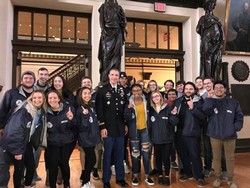The University’s Model United Nations (UN) Team competed at the University of Oxford, UK, and took home two individual Best Delegate Awards over the weekend of Friday, Oct. 26 – Sunday, Oct. 28.
The three-day competition drew universities from across Europe, Africa, the Middle East, and Asia. Eight students represented the University as the only American institution competing in the international conference, serving on separate committees.
“Oxford’s contest is a highlight on the European Model UN Circuit, and it is one of its most competitive,” said Kenneth Mitchell, Ph.D., Chair of the Department of Political Science and Sociology and an associate professor of political science. He serves as one of the team’s advisers and accompanied them on their trip to Oxford.
Mitchell noted that the conference was a great opportunity for students to interact with other students from around the world.
“Each of our eight students worked hard and competed at the three-day event, and two students took home individual speaking awards Mackenzie Ricca (sophomore political science student) and Jackson Pope (senior political science student),” said Mitchell.
“Competing at the Oxford Model UN competition was such an informative, eye-opening experience for me,” said Ricca, the University’s UN team captain. “Throughout the conference, I was surrounded by other very talented delegates who were students at major universities in Europe and around the world like Oxford University, London School of Economics, and Cambridge.”
Ricca explained that the contest was vigorous, which made her be sure to arrive prepared with binders full of research, elaborate speeches, and competitive policymaking strategy. “I was incredibly honored to receive an award for one of the best delegates in the contest and will be forever grateful for the experiences I had abroad,” she said.
Pope explained that this competition was only the second time participating in the University’s Model UN team. He represented the nation of Algeria in the Organization of Islamic Cooperation (OIC). “I began my preparation by doing research on Algeria’s stance on the two [debate] topics: how the Islamic world should respond to LGBT individuals and bridging the Sunni/Shia divide,” he said.
“This research included looking through news articles on statements issued by Algeria, looking through Algeria’s legal code concerning these matters, and general background research on the OIC’s stances on these topics so that I could speak in an informed manner,” he continued.
Pope emphasized that the single most important moment for him in these competitions is the opening speech. “Model UN conferences are equal parts competition and collaboration, so fellow delegates are constantly on the lookout for strong partners that can help them successfully pass a resolution. Your opening speech is your first and best opportunity to signal to the rest of your committee that you’re a serious delegate who can be an important partner to them,” he said.
During this conference, both Pope and Mitchell noted that his opening speech drew the attention of several delegates, which allowed Pope to “position [himself] as a key architect of our first resolution.” Mitchell continued, “[Additionally it] put [him] in contact with other delegates who served as key allies during the second phase of the competition, where discussions and negotiations between the two blocs that formed became hotly contested.”
In the competition, Pope explained that several members of one of their working papers, their coalition was forced to abandon their resolution in order to successfully negotiate a consensus. “However, this concession, and the unity between myself and my allies, we were able to shape their resolution significantly, forcing them to eliminate the clauses that had been objectionable to us while giving up very little from our own plan,” he said.
Pope noted that fellow Model UN member Michael Manning (a senior political science student), who also served as a delegate in the OIC with him, was “instrumental” to his success at the Oxford conference.
The contest combines three days of policy negotiations and debates hosted at various colleges of the University of Oxford, as well as different social events that provide opportunities for networking with students from around the world, including Saturday night’s Black Tie Ball at the historic Ashmolean Museum. Closing ceremonies and awards took place inside the Sheldonian Theatre.
“The Model United Nations Team and Club express sincere gratitude to Provost Laura Moriarty, Business School Dean Don Moliver, SGA (the Student Government Association), and the Department of Political Science and Sociology for their financial support that made this amazing experience possible,” Mitchell stated. And the students extend a special thanks to University alum Sam Maynard, now a doctorate student at Oxford University, and Prachi Patel, now a Master’s student at the School of Oriental and African Studies of London, for their mentorship and support during the contest.
The Model UN team will compete again at the Washington, D.C., Conference this weekend, Friday, Nov. 9 – Sunday, Nov. 11.
PHOTO COURTESY of Kenneth Mitchell, Ph.D.



